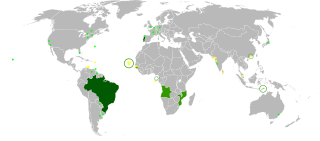 W
WPortuguese is a Romance language originating in the Iberian Peninsula of Europe. It is the sole official language of Portugal, Angola, Mozambique, Guinea-Bissau, Cape Verde, São Tomé and Príncipe, and Brazil, while having co-official language status in East Timor, Equatorial Guinea, and Macau. A Portuguese-speaking person or nation is referred to as "Lusophone". As the result of expansion during colonial times, a cultural presence of Portuguese and Portuguese creole speakers are also found around the world. Portuguese is part of the Ibero-Romance group that evolved from several dialects of Vulgar Latin in the medieval Kingdom of Galicia and the County of Portugal, and has kept some Celtic phonology and its lexicon.
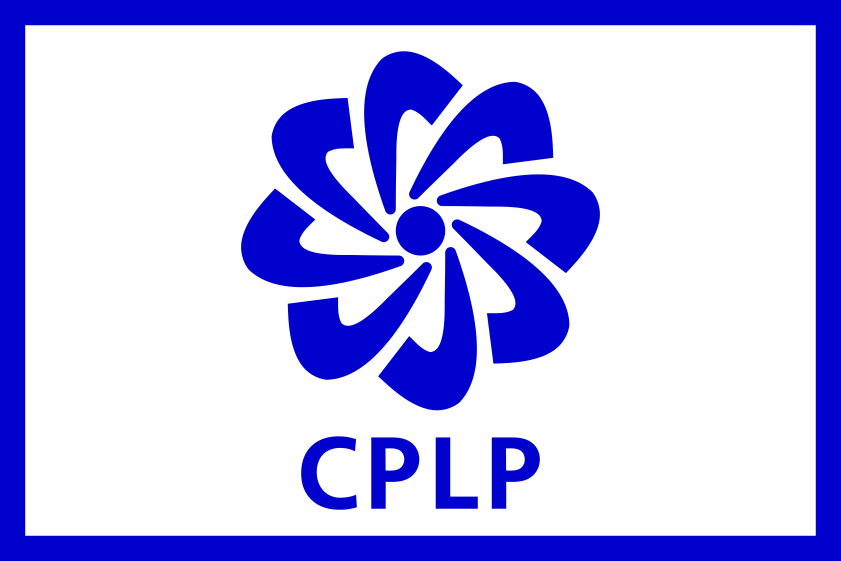 W
WThe Community of Portuguese Language Countries, also known as the Lusophone Commonwealth, is an international organization and political association of Lusophone nations across four continents, where Portuguese is an official language. The CPLP operates as a privileged, multilateral forum for the mutual cooperation of the governments, economies, non-governmental organizations, and peoples of the Lusofonia. The CPLP consists of 9 member states and 19 associate observers, located in Europe, South America, Asia, Sub-Saharan Africa and Oceania.
 W
WÃ/ã is a letter used in some languages, generally considered a variant of the letter A.
 W
WThe Class of Letters of the Lisbon Academy of Sciences holds an official consultative role on the Portuguese language in Portugal.
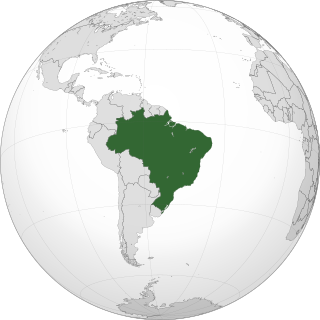 W
WBrazilian Portuguese is the set of dialects of the Portuguese language native to Brazil and the most influential form of Portuguese worldwide. It is spoken by almost all of the 200 million inhabitants of Brazil and spoken widely across the Brazilian diaspora, today consisting of about two million Brazilians who have emigrated to other countries.
 W
WThe Comunidade do Escutismo Lusófono is the international community of Scouting organizations in the Lusophone countries. Its members are:Angola: Associação de Escuteiros de Angola Brazil: União dos Escoteiros do Brasil Cape Verde: Associação dos Escuteiros de Cabo Verde Mozambique: Liga dos Escuteiros de Moçambique Portugal: Federação Escotista de Portugal with the Associação dos Escoteiros de Portugal and the Corpo Nacional de Escutas - Escutismo Católico Português
 W
WThe following is a list of the 10 sovereign states and territories where Portuguese is an official language.
 W
WPortuguese creoles are creole languages which have Portuguese as their substantial lexifier. The most widely spoken creole influenced by Portuguese is the Cape Verdean Creole and Papiamento.
 W
WO novo guia da conversação em portuguez e inglez, commonly known by the name English as She Is Spoke, is a 19th-century book written by Pedro Carolino, with some editions crediting José da Fonseca as a co-author. It was intended as a Portuguese–English conversational guide or phrase book; however, as the "English" translations provided are usually inaccurate or incoherent, it is regarded as a classic source of unintentional humour in translation.
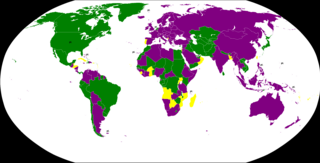 W
WBelow is a list of Portuguese language exonyms for places in non-Portuguese-speaking areas. Some of them are used exclusively in European Portuguese while others appear just in Brazilian Portuguese.
 W
WThe flag of the Community of Portuguese Language Countries, also known as the Flag of the Lusophony, represents the intergovernmental organization for friendship among Lusophone (Portuguese-speaking) nations where Portuguese is an official language. The Portuguese language countries are home to more than 270 million people located across the globe. The CPLP nations cover a combined area of about 10,772,000 square kilometres (4,159,000 sq mi).
 W
WThe Galician Academy of the Portuguese Language is a learned institution dedicated to the advancement, study, and normalization of Galicia's language. The academy promotes Reintegrationism, the concept that the language spoken in Galicia is in fact merely a dialect of the Portuguese language and should be standardized to the international Portuguese norms of language.
 W
WThe Galician Language Association is a reintegrationist association established in 1981 which seeks the full restoration ("re-integration") of Galician as a branch of Galician-Portuguese. It also aims for the official incorporation of Galicia into the Community of Portuguese Language Countries. It was originally formed by professional linguists only, although membership was soon made available to individuals showing an interest in the promotion of Galician culture, language, and the ideas of linguistic reintegrationism.
 W
WThe Instituto Camões is a Portuguese international institution dedicated to the worldwide promotion of the Portuguese language, Portuguese culture, and international aid, on behalf of the Government of Portugal. Headquartered in Lisbon with centers across five continents, the mission of the Instituto Camões is the promotion of Portugal's language, culture, values, charity, and economy. The institution is named for Portuguese Renaissance author Luís Vaz de Camões, considered the greatest poet of the Portuguese language and the national poet of Portugal.
 W
WThe languages of Portugal are the Portuguese, Mirandese and Portuguese Sign Language. Historically, Celtic and Lusitanian were spoken in what is now Portugal.
 W
WThe Latin Union was an international organization of nations that used Romance languages that existed as a functional institution from 1983 to 2012. Headquartered in Paris, France, its aim was to protect, project, and promote the common cultural heritage of Latin peoples and unifying identities of the Latin, and Latin-influenced, world. It was created in 1954 in Madrid, Spain, and its membership rose from 12 to 36 states, including countries in North America, South America, Europe, Africa, and the Asia-Pacific region.
 W
WThe Lusofonia Games is a multinational multi-sport event organized by the ACOLOP, which involves athletes coming from Lusophone (Portuguese-speaking) countries, most countries competing are countries that are members of the CPLP, but some are countries with significant Portuguese communities or have a history with Portugal
 W
WThe Organization of Ibero-American States has the below 23 member states:
 W
WMendinho, also Meendinho, Mendiño and Meendiño, was a medieval Iberian poet.
 W
WThe Organization of Ibero-American States, formally the Organization of Ibero-American States for Education, Science and Culture, is an international organization made up of 23 members states of Iberophone nations in Europe and the Americas, as well as one member in Africa. The OEI's membership is composed of all of the sovereign states of Ibero-America and the Iberian Peninsula, as well as Equatorial Guinea. All members are Portuguese and Spanish speaking nations, in addition to Andorra, which is predominantly Catalan speaking, though the organization does not include all the Iberophone nations of the world.
 W
WPortuguese orthography is based on the Latin alphabet and makes use of the acute accent, the circumflex accent, the grave accent, the tilde, and the cedilla to denote stress, vowel height, nasalization, and other sound changes. The diaeresis was abolished by the last Orthography Agreement. Accented letters and digraphs are not counted as separate characters for collation purposes.
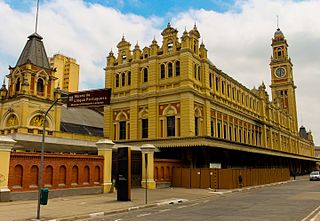 W
WThe Museum of the Portuguese Language is an interactive Portuguese language—and Linguistics/Language Development in general—museum in São Paulo, Brazil. It is housed in the Estação da Luz railway station, in the urban district of the same name. Three hundred thousand passengers arrive and leave the station every day, and the choice of the building for the launching of the museum is connected to the fact that it was mainly here that thousands of non-Portuguese speaking immigrants arriving from Europe and Asia into São Paulo via the Port of Santos got acquainted with the language for the first time. The idea of a museum-monument to the language was conceived by the São Paulo Secretary of Culture in conjunction with the Roberto Marinho Foundation, at a cost of around 37 million reais.
 W
WMost of the Portuguese vocabulary comes from Latin because Portuguese is a Romance language.
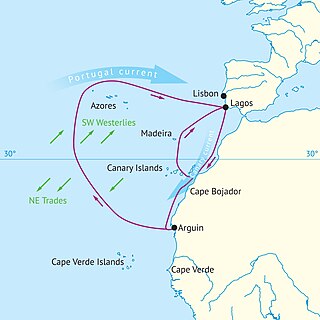 W
WVolta do mar, volta do mar largo, or volta do largo is a navigational technique perfected by Portuguese navigators during the Age of Discovery in the late fifteenth century, using the dependable phenomenon of the great permanent wind circle, the North Atlantic Gyre. This was a major step in the history of navigation, when an understanding of winds in the age of sail was crucial to success: the European sea empires would never have been established had the Europeans not figured out how the trade winds worked.
 W
WIn Portugal, the Word of the Year poll is carried out since 2009 by the Porto Editora publishing house.